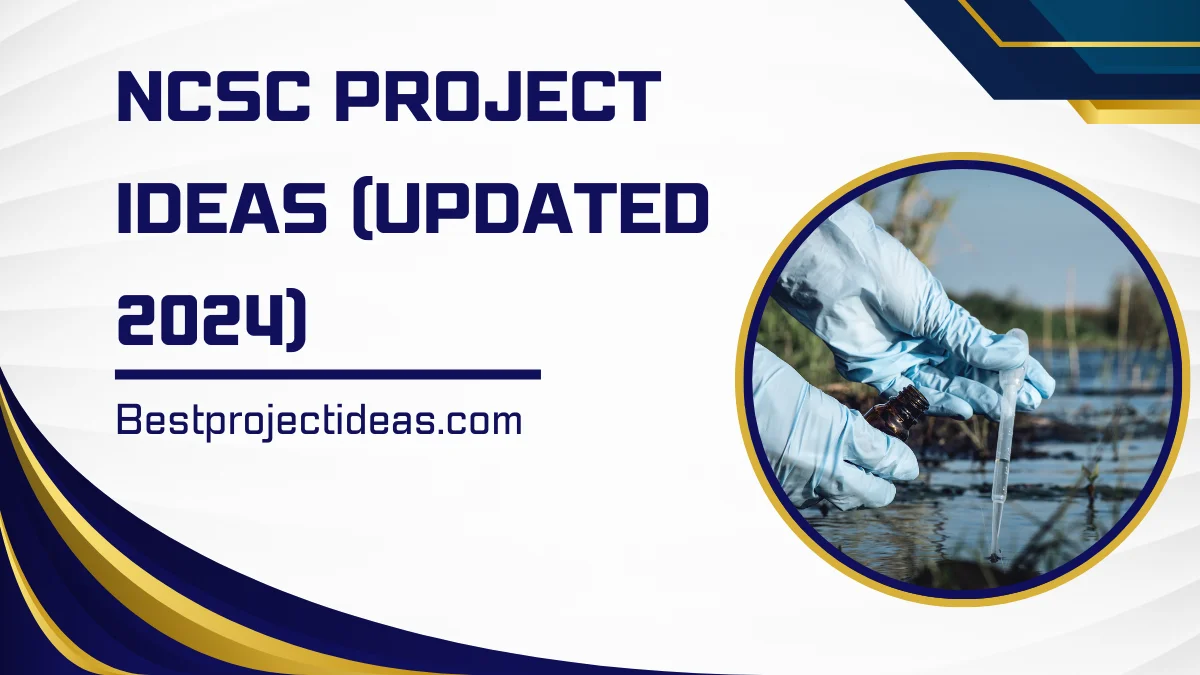
The National Children’s Science Congress (NCSC) sparks young scientists’ imaginations! This event gives kids the chance to explore exciting discoveries.
Through fun experiments and creative ideas, children learn about the world around them. They can study plants, build simple machines, and try many other cool things. NCSC projects help kids understand science while having fun.
They get to be curious, ask questions, and find answers themselves. It’s a chance for young minds to shine and maybe even solve real-world problems!
Must Read: 241+ Unique Ofrenda Project Ideas For School Students
What Do You Mean By NCSC Project?
The National Children’s Science Congress (NCSC) is a yearly science program in India. It encourages scientific thinking and creativity in children aged 10-17. The project lets students study local science and environmental issues.
They pick topics, gather data, analyze them, and share their findings at district, state, and national levels. The NCSC promotes hands-on learning, problem-solving, and using the scientific method.
It also helps students improve their communication by presenting projects. Since 1993, the program has been organized by the Department of Science and Technology, Government of India, with help from state-level organizations.
NCSC 2024-25 Theme
The main theme for the 31st National Children’s Science Congress (NCSC) 2024-25 is:
“Science for Sustainable Development”
This theme invites kids to think about scientific ideas to help solve big problems like climate change, using up resources, and protecting the environment.
NCSC allows children to research, create, and share their projects on topics related to this theme.
NCSC Project Ideas For High School
Here are the top-rated NCSC Project Ideas For High School students:
Environmental Science
- Investigate renewable energy sources for schools.
- Design a sustainable community garden project.
- Analyse microplastics in local water bodies.
- Explore urban composting methods for food waste.
- Study the impact of deforestation on local wildlife.
- Develop a recycling program for electronic waste.
- Investigate the effectiveness of rainwater harvesting systems.
- Analyze the carbon footprint of school activities.
- Design a biodiversity conservation plan for a local park.
- Explore the use of biofuels as alternative energy sources.
- Investigate the impact of air pollution on plant growth.
- Develop a project to reduce single-use plastic consumption.
- Analyze the efficiency of solar panels in different climates.
- Explore the use of hydroponics for urban food production.
- Investigate the impact of invasive species on local ecosystems.
- Design a project to promote sustainable transportation options.
- Analyze the effectiveness of green roofs in urban areas.
- Explore the use of geothermal energy for home heating and cooling.
- Investigate the impact of noise pollution on human health.
- Develop a project to promote environmental awareness in the community.
Health and Medicine
- Investigate the impact of exercise on mental health.
- Analyze the effectiveness of traditional herbal remedies.
- Explore the use of technology in healthcare delivery.
- Investigate the impact of diet on gut microbiome.
- Design a project to promote healthy habits in schools.
- Analyze the effectiveness of alternative pain management techniques.
- Explore the use of virtual reality in physical therapy.
- Investigate the impact of air quality on respiratory health.
- Design a project to promote mental health awareness.
- Analyze the effectiveness of mindfulness practices on stress reduction.
- Explore the use of 3D printing in medical device development.
- Investigate the impact of sleep on cognitive function.
- Design a project to promote healthy habits in the community.
- Analyze the effectiveness of telemedicine in rural areas.
- Explore the use of wearable technology in health monitoring.
- Investigate the impact of social media on mental health.
- Design a project to promote healthy aging in older people.
- Analyze the effectiveness of traditional Chinese medicine.
- Explore the use of artificial intelligence in disease diagnosis.
- Investigate the impact of environmental toxins on human health.
Technology and Innovation
- Design a smart home automation system.
- Develop a mobile app to promote environmental sustainability.
- Explore the use of drones in agriculture or disaster response.
- Analyze the impact of artificial intelligence on job markets.
- Design a project to promote STEM education in underserved communities.
- Investigate the use of blockchain technology in supply chain management.
- Develop a robotic system to assist older people or people with disabilities.
- Explore the use of virtual reality in education or training.
- Analyze the impact of the Internet of Things on daily life.
- Design a project to promote the use of renewable energy sources.
- Investigate the use of 3D printing in product development.
- Explore the use of machine learning in predictive analytics.
- Develop a project to promote the use of sustainable transportation options.
- Analyze the impact of social media on communication and information sharing.
- Design a project to promote the use of renewable energy sources in schools.
- Investigate the use of nanotechnology in medical applications.
- Explore the use of augmented reality in gaming or education.
- Develop a project to promote the use of sustainable building materials.
- Analyze the impact of automation on manufacturing processes.
- Design a project to promote using renewable energy sources in the community.
Social Sciences and Humanities
- Investigate the impact of gender stereotypes on career choices.
- Explore the role of social media in shaping political discourse.
- Analyze the impact of globalization on cultural diversity.
- Develop a project to promote the rights of marginalized communities.
- Investigate the influence of media on public perception of current events.
- Explore the role of education in fostering social and economic mobility.
- Analyze the impact of migration on host communities and economies.
- Develop a project to promote intercultural understanding and dialogue.
- Investigate the influence of religious beliefs on social and political issues.
- Explore the role of art and literature in shaping cultural identity.
- Analyze the impact of economic inequality on social and political stability.
- Develop a project to promote the rights of children and youth.
- Investigate the influence of social media on mental health and well-being.
- Explore the role of language in preserving cultural heritage.
- Analyze the impact of gender-based violence on individuals and communities.
- Develop a project to promote the rights of people with disabilities.
- Investigate the influence of traditional gender roles on career aspirations.
- Explore the role of non-governmental organizations in addressing social issues.
- Analyze the impact of climate change on vulnerable populations.
- Develop a project to promote the rights of indigenous communities.
Agriculture and Food Science
- Develop a sustainable hydroponics system for urban food production.
- Investigate the impact of climate change on crop yields and food security.
- Design an intelligent irrigation system to optimize water usage in agriculture.
- Analyze the nutritional content of traditional and genetically modified crops.
- Explore the use of drones in precision agriculture for monitoring and spraying.
- Investigate the impact of organic farming practices on soil health and biodiversity.
- Design a project to promote urban gardening and community-supported agriculture.
- Analyze the potential of aquaponics systems for sustainable food production.
- Explore the use of blockchain technology in supply chain traceability for food.
- Investigate the impact of food processing on nutrient retention and shelf life.
- Design a project to promote sustainable fishing practices and marine conservation.
- Analyze the potential of alternative protein sources, such as insects or algae.
- Explore the use of machine learning in crop disease detection and management.
- Investigate the impact of food waste on greenhouse gas emissions and landfill waste.
- Design a project to promote sustainable livestock management and animal welfare.
- Analyze the potential of vertical farming for urban food production.
- Explore the use of renewable energy in agricultural operations.
- Investigate the impact of soil microbiome on plant health and productivity.
- Design a project to promote sustainable and equitable food distribution systems.
- Analyze the potential of urban foraging and wild harvesting for food security.
NCSC Project Ideas for Class 9:
- Make a solar-powered water purifier for villages.
- Create a hydroponic garden for cities.
- Build an app to check local air quality.
- Make a model of a smart home using renewable energy.
- Study how microplastics affect sea animals.
- Design eco-friendly food packaging.
- Start a local recycling program.
- Build a device to turn waste heat into electricity.
- Explore the benefits of vertical farming in cities.
- Create a water-saving irrigation system.
- Study using eco-friendly materials in buildings.
- Make a school or community waste management system.
- Build a low-cost air filter for rooms.
- Study how cutting down trees hurts biodiversity.
- Make a model of a school garden ecosystem.
- Research algae-based biofuels in your area.
- Create a rainwater collection system for homes.
- Start a community composting program.
- Build a renewable energy-powered water pump.
- Study the benefits of urban beekeeping.
- Create a model of an autonomous aquaponics system.
- Study the effects of invasive species on ecosystems.
- Design an energy-efficient home heating system.
- Build a low-cost water filter for villages.
- Study wildlife corridors in cities.
- Make a waste-to-energy model.
- Research eco-friendly materials in clothing.
- Build a system to turn cooking oil into biodiesel.
- Create a rooftop garden in your town.
- Build a renewable energy-powered desalination unit.
- Study how climate change affects farming.
- Make a model of a self-sustaining community.
- Research urban composting in your area.
- Turn waste plastic into useful products.
- Study biomimicry in product design.
- Make a renewable energy-powered water heater.
- Start a community-based urban farming project.
- Create a self-sustaining ecosystem model.
- Study microplastics in freshwater ecosystems.
- Turn agricultural waste into biofuel.
- Explore wetland restoration in cities.
- Build a renewable energy-powered lighting system.
- Study how deforestation affects soil quality.
- Make a sustainable transportation system model.
- Study the use of eco-friendly materials in furniture.
- Build a system to turn food waste into compost.
- Research urban wildlife sanctuaries.
- Build a renewable energy-powered water purifier.
- Start a community renewable energy project.
- Create a self-sustaining urban ecosystem model.
NCSC Project Ideas for Science:
- Build a device to find microplastics in water.
- Study how climate change affects birds.
- Create a model of a self-sustaining aquatic ecosystem.
- Study how bioremediation helps clean contaminated soil.
- Build a system to turn farm waste into biogas.
- Explore using bioluminescent organisms for lighting.
- Build a renewable energy-powered desalination unit.
- Study how nanotechnology works in water filtration.
- Make a closed-loop farming system model.
- Start a community-based composting project.
- Turn waste plastic into building materials.
- Research algae-based biofuels in your area.
- Build a renewable energy-powered water pump.
- Study the effects of invasive species on biodiversity.
- Create a self-sustaining urban ecosystem model.
- Research urban beekeeping in your area.
- Turn waste cooking oil into biodiesel.
- Study biomimicry in sustainable product design.
- Make a renewable energy-powered air purifier.
- Study how microplastics harm marine life.
- Create an autonomous urban farming system.
- Start a community-based renewable energy project.
- Turn food waste into biofuel.
- Explore wetland restoration in your city.
- Build a renewable energy-powered water heater.
- Study the use of eco-friendly materials in clothing.
- Make a closed-loop waste management system model.
- Study urban rooftop gardening.
- Turn agricultural waste into compost.
- Explore using bioluminescent organisms for lighting.
- Build a renewable energy-powered smart home.
- Study how deforestation harms soil quality.
- Create a self-sustaining aquaponics system.
- Study wildlife corridors in cities.
- Turn waste plastic into useful products.
- Use nanotechnology in water purification systems.
- Build a renewable energy-powered water filter.
- Study the effects of climate change on marine life.
- Make a self-sustaining urban transportation system.
- Research urban wildlife sanctuaries.
- Turn agricultural waste into biofuel.
- Study biomimicry in building materials.
- Make a renewable energy-powered air conditioning unit.
- Study how microplastics harm freshwater organisms.
- Build an autonomous closed-loop energy system.
- Explore vertical farming in cities.
- Turn cooking oil into biodiesel.
- Study using bioluminescent organisms in medicine.
- Build a renewable energy-powered water desalination unit.
- Study the effects of invasive species on plants.
NCSC Project Ideas on “Know Your Ecosystem”:
- Map and study the biodiversity in a local park.
- Study how city growth affects bird populations.
- Start a citizen science project to check water quality.
- Study how pollinators help in gardens.
- Create a guide to local plants and their benefits.
- Research how invasive species affect wetlands.
- Make a plan to restore a local green space.
- Study how soil health affects plants.
- Start a community program to teach about ecosystems.
- Study how climate change impacts coastal ecosystems.
- Create a model of an autonomous food system in cities.
- Explore how urban beekeeping helps pollinators.
- Start a program to monitor endangered species.
- Study how urban forests reduce air pollution.
- Create a guide to the benefits of local habitats.
- Study how stormwater runoff affects streams.
- Make a plan to restore a habitat for wildlife.
- Research how urban composting helps soils and reduces waste.
- Study how wetlands help with floods and clean water.
- Create a virtual tour of a local ecosystem.
- Study how urbanization changes bird migration.
- Start a citizen science project to monitor local forests.
- Explore how rooftop gardens can help with biodiversity.
- Make a plan for urban wildlife corridors.
- Study how trees in cities help reduce heat.
- Create a guide to the uses of local plants.
- Study how recreation impacts ecosystems.
- Start a program to restore a stream habitat.
- Explore how wetland restoration supports wildlife.
- Make a plan to manage stormwater in your area.
- Study how green spaces improve health.
- Create a guide to the functions of a local ecosystem.
- Study how climate change affects local animals and plants.
- Start a citizen science project to check local forests.
- Explore how urban farming improves food security.
- Make a plan to create wildlife sanctuaries.
- Study how urban green spaces fight air pollution.
- Create a guide to the cultural importance of local ecosystems.
- Study how invasive species harm wetland biodiversity.
- Start a program to restore urban green spaces.
- Explore how urban beekeeping helps pollination and food production.
- Make a plan to manage how people affect ecosystems.
- Study how urban forests provide ecosystem services and help with health.
- Create a virtual tour of a local ecosystem for learning.
- Study how urbanization affects wildlife habitats.
- Start a citizen science project to monitor local streams.
- Explore how composting helps soil for urban farming.
- Make a plan for wildlife corridors to help biodiversity.
- Study how urban wetlands help prevent floods and clean water.
What Are The Benefits Of The NCSC Project?
1. Scientific thinking: Helps develop critical thinking and scientific inquiry skills.
2. Hands-on learning: Gives practical experience in doing research.
3. Problem-solving: Encourages students to solve real-world issues in creative ways.
4. Environmental awareness: Increases understanding of local environmental problems.
5. Communication skills: Improves the ability to share ideas and results.
6. Teamwork: Builds collaboration skills when working on group projects.
7. Self-confidence: Boosts self-esteem through achievements and recognition.
8. Networking: Offers a chance to meet peers and experts from different areas.
9. Career exploration: Shows students possible careers in science and technology.
10. Community impact: Let students help improve their communities through projects.
How Do You Write A Good NCSC Project?
To write a good National Children’s Science Congress (NCSC) project, follow these steps:
1. Choose a topic: Pick a local issue about science, technology, or the environment that affects your community.
2. Set clear goals: Say what you want to learn or achieve with your project.
3. Do research: Find background information from reliable sources.
4. Plan your method: Create a step-by-step plan to collect data and experiment.
5. Collect and study data: Gather information through surveys, experiments, or observations. Analyze what you find.
6. Make conclusions: Understand your results and explain how they match your goals.
7. Offer solutions: Suggest ways to solve the problem you studied.
8. Record your work: Keep notes of your process, including your idea, steps, data, and results.
9. Create a good presentation: Make a clear, short, and exciting presentation of your project.
10. Practice explaining: Be ready to discuss your project and answer any questions.
Also Read: Amazing 499+ AI Project Ideas for Students 2024
Wrap Up
NCSC project ideas bring excitement to young scientists. By working on these projects, kids learn to think like researchers and solve problems. They gain confidence in themselves and discover new things they like.
The skills from NCSC projects help in school and later in life. Whether a child wants to be a scientist or enjoys learning, these projects are essential. NCSC projects show that science is all around us and can be fun.
They encourage kids to keep exploring, asking questions, and finding answers. Who knows? Today’s NCSC project might lead to tomorrow’s big idea!

